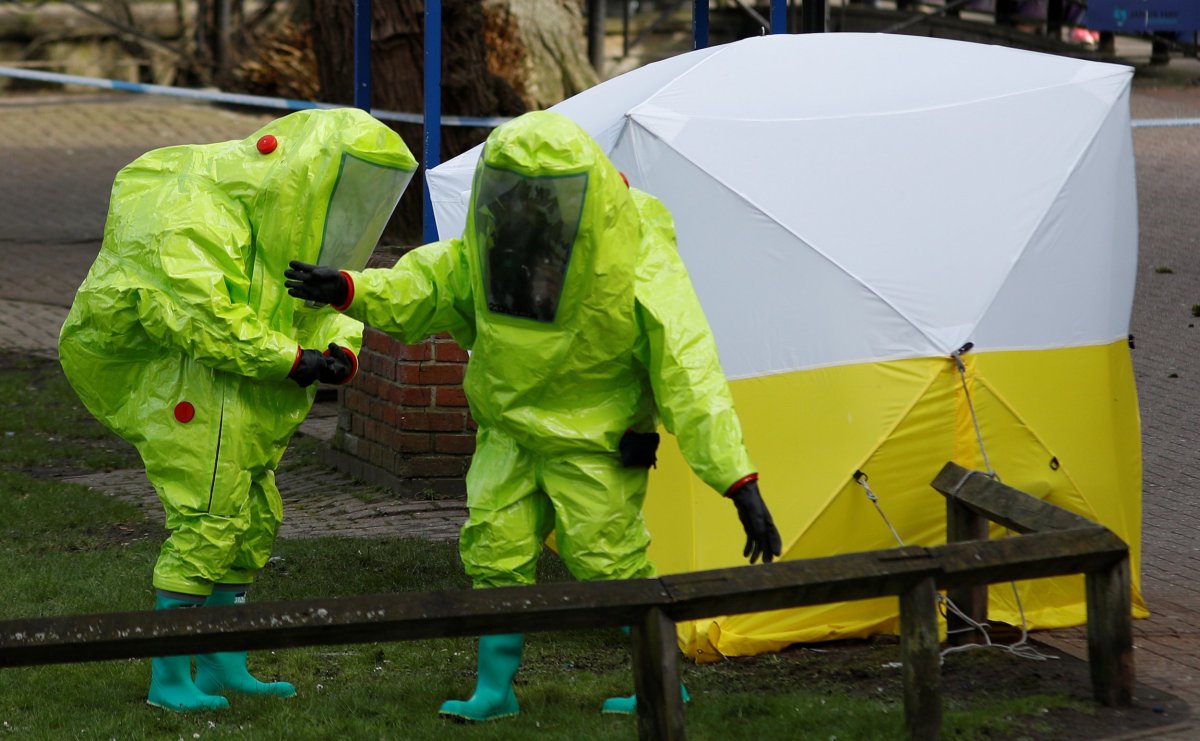On March 4, former Russian spy Sergei Skripal and his daughter collapsed on a bench in the English cathedral city of Salisbury. Attending police officer Nick Bailey was quickly taken seriously ill as well and, a week later, a national public health body told fellow customers of local businesses visited by the Skripals to wash the clothes they had been wearing at the time.
Yesterday, U.K. Prime Minister Theresa May told politicians a class of military-grade nerve agent was to blame: Novichok.
But what is Novichok, and how did it make its way to this sleepy English city?

G-Series: The first generation of nerve agents
In the 1930s, unbeknown to Allied intelligence forces, German scientists discovered the first generation of nerve agents while searching for new pesticides. These pesticides became a family of devastating chemical weapons.
In 1945, strange ammunition shells from Germany shocked scientists at the U.K. government's Porton Down facility.
The lab had originally been started to test chemical weapons during the First World War, Ulf Schmidt, professor of modern history at the University of Kent and author of Secret Science: A Century of Poison Warfare and Human Experiments, told Newsweek.
Porton Down was used to seeing mustard gas and phosgene, not sarin, tabun and soman.
These new chemical weapons inhibited an enzyme called acetylcholinesterase, causing nerve communications to fail and muscles to contract. Victims would convulse and ultimately die—dramatically and rapidly—as heart failure and asphyxiation set in, Schmidt explained.
Venomous Agent X
VX, more potent than sarin, is probably the most famous of the next generation of nerve agents: V-agents. Also known as "venomous agent X," VX was developed in the U.K. in the 1950s.
A tasteless and odorless liquid, VX is classed as a weapon of mass destruction by the U.N.
VX came to media attention last year when it was reportedly used to assassinate North Korean exile Kim Jong-nam at a Malaysian airport.
On March 5 of this year, the U.S. Department of State slapped additional sanctions on North Korea in response to what was determined to be a VX attack.
Novichok agents
Novichok agents are a third generation of nerve agents, developed in the 1970s and 1980s by the Soviet Union. They can take the form of a powder rather than a gas or liquid.
The idea behind the agents, Schmidt said, was to avoid detection by NATO forces, potentially rendering NATO protective clothing vulnerable, and to be handled relatively safely as binary agents.
Binary chemical weapons can be transported as separate, safer chemical precursors. When mixed together, the compounds become incredibly toxic.
On March 11, the BBC reported that traces of a nerve agent had been found at the restaurant where the former spy and his daughter had eaten. Novichok agents can persist far longer than agents like sarin, Schmidt said, which makes them a good candidate for the poisoning.
"The small amount of substance that was discovered days after the incident suggests the agent is considerably persistent," he explained.
Where did it come from?
It seems unlikely the nerve agent itself was produced in the U.K. because of the expertise and means required, Schmidt said.
To produce a Novichok agent below the radar of MI5, he said, would be "quite an achievement, to say the least."
"You need to have extensive knowledge, resources, facilities, equipment to actually produce something like that," he explained. "We're certainly dealing with the extreme end of...chemical warfare expertise."
It is probably more likely, Schmidt said, that the chemical weapon was brought into the country at some point.
How the nerve agent actually made its way to Salisbury remains unknown. Whether it was produced and administered by Russia, another state, or even non-state actors, is yet to be revealed.
"We will have to wait and see," Schmidt said.
Uncommon Knowledge
Newsweek is committed to challenging conventional wisdom and finding connections in the search for common ground.
Newsweek is committed to challenging conventional wisdom and finding connections in the search for common ground.
About the writer
Katherine Hignett is a reporter based in London. She currently covers current affairs, health and science. Prior to joining Newsweek ... Read more
To read how Newsweek uses AI as a newsroom tool, Click here.








